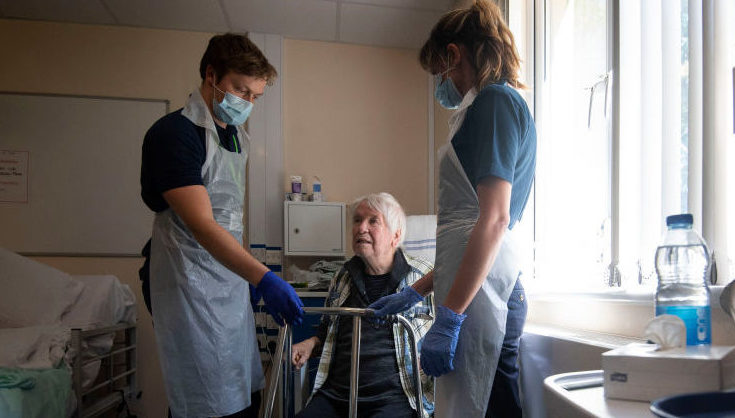A bleak but timely long read this week at Kosciuszko Review by biomedical analyst Tom Tyler who examines the global implications of our ageing demographics through the lens of Covid-19. The virus has, he argues, revealed both the looming demographic crisis and also the acute vulnerability of ageing populations to a pandemic:
Care homes, Tyler shows, are relatively recent innovations that have sprung up to deal with changing demographics, serving some 400,000 elderly people in the UK and employing 1.47 million care workers. These workers are typically women, often immigrants, and perform gruelling work in often-poor conditions for low pay. As turnover is high in the sector, care homes turn to overseas workforces for staff, intensifying toxic debates about immigration. Meanwhile, the countries from which migrant workers are recruited themselves face the same demographic time-bomb — only without the resources to ‘pull’ migrant workers from elsewhere to plug their own care gaps:
And even as countries compete to displace their demographic problem onto other, poorer countries that face the same challenges, Tyler argues that housing the elderly together for care is a model acutely vulnerable to pandemics. If you cluster large numbers of frail elderly people in close proximity, with the same people caring for all of them, it only takes one infected carer for a disease to reach every resident in the care home. And we can be confident that Covid-19 won’t be the last pandemic.
What prospects are there, then, of averting another Covid-19 care home catastrophe, or of a more drawn-out collapse of the model under demographic or economic pressures? Though medical advances may eventually be able to help future generations sustain independent living into old age, Tyler suggests we shouldn’t bank on it — not for several decades at least, by which time we’ll be well into the crisis.
Other solutions focus more on societal changes that will challenge prevailing ideas about how we organise ourselves. It’s too early to tell whether pronatalist policies in countries such as Hungary will be enough to reverse that country’s demographic decline, but it’s difficult to imagine such a policy arriving in Britain without fierce liberal opposition. Likewise, multi-generational living may offer some support — but it’s difficult when very little of the housing stock is built for such arrangements.
The likely near-future, meanwhile, is a bleak mix of ever more expensive care homes, marginalised elderly people, rapidly-spreading infections, care responsibilities falling once more on families and local communities — and what the Japanese call ‘kokodushi’: in Tyler’s words, ‘old people dying alone in their apartments and remaining undiscovered for weeks, months, occasionally years.’











Join the discussion
Join like minded readers that support our journalism by becoming a paid subscriber
To join the discussion in the comments, become a paid subscriber.
Join like minded readers that support our journalism, read unlimited articles and enjoy other subscriber-only benefits.
Subscribe